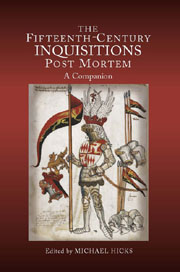Book contents
- Frontmatter
- Contents
- List of Tables and Figures
- List of Contributors
- Preface
- Glossary
- Abbreviations
- 1 Introduction
- 2 Crossing Generations: Dower, Jointure and Courtesy
- 3 The Lesser Landowners and the Inquisitions Post Mortem
- 4 Tales of Idiots, Signifying Something: Evidence of Process in the Inquisitions Post Mortem
- 5 The Value of Fifteenth-Century Inquisitions Post Mortem for Economic and Social History
- 6 ‘Notoriously Unreliable’: The Valuations and Extents
- 7 The Descriptions of Land Found in the Inquisitions Post Mortem and Feet of Fines: A Case Study of Berkshire
- 8 Re-assessing Josiah Russell's Measurements of Late Medieval Mortality using the Inquisitions Post Mortem
- 9 A Great Historical Enterprise: The Public Record Office and the Making of the Calendars of Inquisitions Post Mortem
- 10 Writs and the Inquisitions Post Mortem: How the Crown Managed the System
- 11 ‘Thrifty Men of the Country’? The Jurors and Their Role
- 12 Place-Names and Calendaring Practices
- Index
8 - Re-assessing Josiah Russell's Measurements of Late Medieval Mortality using the Inquisitions Post Mortem
Published online by Cambridge University Press: 05 February 2013
- Frontmatter
- Contents
- List of Tables and Figures
- List of Contributors
- Preface
- Glossary
- Abbreviations
- 1 Introduction
- 2 Crossing Generations: Dower, Jointure and Courtesy
- 3 The Lesser Landowners and the Inquisitions Post Mortem
- 4 Tales of Idiots, Signifying Something: Evidence of Process in the Inquisitions Post Mortem
- 5 The Value of Fifteenth-Century Inquisitions Post Mortem for Economic and Social History
- 6 ‘Notoriously Unreliable’: The Valuations and Extents
- 7 The Descriptions of Land Found in the Inquisitions Post Mortem and Feet of Fines: A Case Study of Berkshire
- 8 Re-assessing Josiah Russell's Measurements of Late Medieval Mortality using the Inquisitions Post Mortem
- 9 A Great Historical Enterprise: The Public Record Office and the Making of the Calendars of Inquisitions Post Mortem
- 10 Writs and the Inquisitions Post Mortem: How the Crown Managed the System
- 11 ‘Thrifty Men of the Country’? The Jurors and Their Role
- 12 Place-Names and Calendaring Practices
- Index
Summary
In 1948 Josiah Russell published what was a remarkably innovative study in the demographic history of medieval England. It principally involved exploitation of evidence in the Domesday Survey, bishops' registers, an array of manorial extents, the poll taxes and the inquisitions post mortem. Russell's approach displayed a competence in demographic methodology that was unusual, indeed precocious, for a historian of population at this time. The book, one could claim, was unique in an era that pre-dated the formal emergence of historical demography in the 1960s by almost three decades. It revealed a striking willingness to experiment with formal demographic methodology on sources that had never been created with the purpose of recording the flow of vital events or measuring demographic stocks. While over the years its shortcomings have been exposed, it contains much material that is of immense value for medieval English demographic analysis. Its findings continue to be cited and none more so than the estimates Russell made of life expectancy of the tenants-in-chief of the crown based upon the inquisitions post mortem (IPMs). In this chapter the focus will be on Russell's use of the IPMs in the form of a reassessment of his approaches with a view to establishing means of refining estimates of adult life expectancy and the seasonality of mortality from these sources.
- Type
- Chapter
- Information
- The Fifteenth-Century Inquisitions 'Post Mortem'A Companion, pp. 155 - 168Publisher: Boydell & BrewerPrint publication year: 2012



